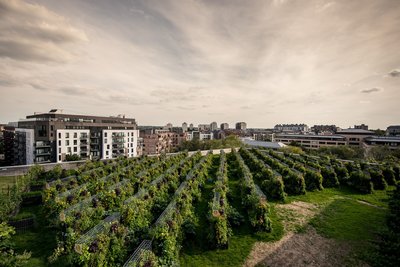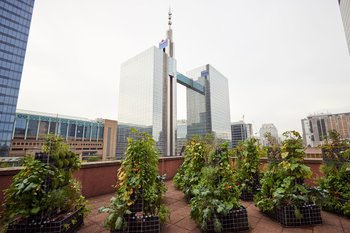Brussels is much more than just a capital: with half its territory made up of public parks and private gardens it is quite a ‘green’ one. In addition to that, there is a growing trend of people cultivating their own food, individually or collectively. Nowadays, an increasing amount of businesses are supporting the concept of eating locally produced food. This, however, was not always the case and it is thanks to initiatives like Peas & Love that our cities increasingly offer eco-systemic services such as urban farming, to improve the quality of life for its inhabitants.
For Jean-Patrick Scheepers, the founder of Peas & Love, the story began in 2013 as he was involved with organising events in the food business. This is when urban farming as a concept triggered his interest. Since he is no agricultural engineer, he teamed up with a professor specialised in urban farming. After a couple of months, however, they realised that the required technology is not yet available to make urban agriculture a viable business model. Furthermore, they had to advocate for this development in society, particularly among the real estate sector and policymakers.
While the current media coverage on urban farming is high, the number of actual projects is rather low. This discrepancy stems from the general confusion that people do not generally understand what urban farming actually is; a garden, for example, can be considered urban farming. Therefore, the very concept of urban farming is as old as cities are. Modern times have changed urban farming quite a bit, however: increasing economic pressure on space in cities, have seen urban farmers turn to new techniques and technologies to keep it a viable market. The notion ‘viable market’ ought to be relativized, however, as opposed to general beliefs, urban farming alone is not able to feed the world. For instance, it would take 3 times the surface area of Paris to feed all the Parisians. Additionally, the costs of production are very high, making it impossible to compete with rural agricultural areas or automated greenhouse farms, especially because retailers mostly think about cost effectiveness. People in developed countries (unlike people in developing countries) no longer invest a lot of money in food anymore. This puts added pressure on urban farming, were it to want to compete in the market.
So, what can be the role of urban farming? As mentioned earlier, not to feed the city but rather to reconnect its citizens with nature and foster a sustainable urban development. Based on that premise, Peas & Love provides a service which cultivates fruits and vegetables for people who do not have the time themselves. Furthermore, they provide information on the cultivation and let them harvest the produce in order to reconnect with nature and invoke a certain mindset. Hence, a next step might be that their clients consider having their own urban garden at home.

This is how we imagine the city of the future. It will grow in small areas effectively bringing back village life. We se this comeback today already: the return to smaller shops, a more people-centred lifestyle, etc. There is a growing feeling that the city needs to be the place to sleep, eat, and enjoy, as well as work. These functions need to be mixed, and the cities of the future will adapt to those needs.
Clients of urban farms today are prepared to spend a lot on their products, and the main arising problem is that the farms are few and far in between. Smaller farms in closer areas could head that issue and show the return to ‘village life’ in cities.
Another challenge is technology: urban farming needs certain things: solid roofs, easy access, and adapted farming. Most farming has been created for the countryside, where a different set of challenges are present. Space, however, is not one of those; in urban farming, the productivity per square meter needs to be much higher than in the countryside, not in the least because the pressure by clients is high. This is why we farm in vertical plots and save space without conceding on yield. Urban farming needs to take place in areas that are either not wanted by people, or simply not used. In using building rooftops, it also needs to be light as not to be a hazard for the people working in the buildings. Climate change also affects us, so crops need to be resistant to this challenge, as to stay productive.
These challenges are coped with by strengthening the know-how and skills of our urban farmers, and with technology: smart farming has been implemented, so that we can remotely manage the farm. Technology can measure everything from water, growth, and other information. Research is also done to use fertilisers in the most effective way possible.
 We have showed that this can all come together in productive and accessible urban farms. This connects people back to nature and teaches people to have more respect for nature. Through a creative business model, we can make this accessible for a lot of people, while staying in business. Production costs are high though, as competition comes both from ‘traditional’ farms, as from highly automated farms and glass house farms in cities like Amsterdam.
We have showed that this can all come together in productive and accessible urban farms. This connects people back to nature and teaches people to have more respect for nature. Through a creative business model, we can make this accessible for a lot of people, while staying in business. Production costs are high though, as competition comes both from ‘traditional’ farms, as from highly automated farms and glass house farms in cities like Amsterdam.
Regulation could improve though. As a good legal framework could help us know clearly what subsidies we can count on, which in turn makes our entrance in the market easier when e.g. closing contracts with schools for healthy lunches. For cities to take farming into account when subsidising buildings, could also help the shift. This is all on a city council level, so these politicians are approachable and close to the public. One major change on a higher level, however, would be for the Common Agricultural Policy (CAP) of the EU. Therein, all farmers can count on subsidies, except for urban farmers. A change in this policy, can do a lot for the further development of urban farming.
The end goal of the project? It would be for people to take home the knowledge and passion they can see in these urban farms and start a vegetable garden at home. How much shorter can you make farm to table than that?
Thank you, Jean-Patrick, for this interview. Your optimism and view of the future are both infectious and inspiring.
